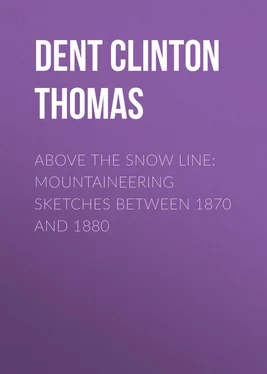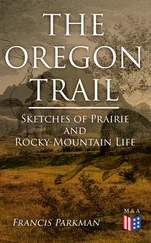Clinton Dent - Above the Snow Line - Mountaineering Sketches Between 1870 and 1880
Здесь есть возможность читать онлайн «Clinton Dent - Above the Snow Line - Mountaineering Sketches Between 1870 and 1880» — ознакомительный отрывок электронной книги совершенно бесплатно, а после прочтения отрывка купить полную версию. В некоторых случаях можно слушать аудио, скачать через торрент в формате fb2 и присутствует краткое содержание. Жанр: foreign_antique, foreign_prose, на английском языке. Описание произведения, (предисловие) а так же отзывы посетителей доступны на портале библиотеки ЛибКат.
- Название:Above the Snow Line: Mountaineering Sketches Between 1870 and 1880
- Автор:
- Жанр:
- Год:неизвестен
- ISBN:нет данных
- Рейтинг книги:4 / 5. Голосов: 1
-
Избранное:Добавить в избранное
- Отзывы:
-
Ваша оценка:
- 80
- 1
- 2
- 3
- 4
- 5
Above the Snow Line: Mountaineering Sketches Between 1870 and 1880: краткое содержание, описание и аннотация
Предлагаем к чтению аннотацию, описание, краткое содержание или предисловие (зависит от того, что написал сам автор книги «Above the Snow Line: Mountaineering Sketches Between 1870 and 1880»). Если вы не нашли необходимую информацию о книге — напишите в комментариях, мы постараемся отыскать её.
Above the Snow Line: Mountaineering Sketches Between 1870 and 1880 — читать онлайн ознакомительный отрывок
Ниже представлен текст книги, разбитый по страницам. Система сохранения места последней прочитанной страницы, позволяет с удобством читать онлайн бесплатно книгу «Above the Snow Line: Mountaineering Sketches Between 1870 and 1880», без необходимости каждый раз заново искать на чём Вы остановились. Поставьте закладку, и сможете в любой момент перейти на страницу, на которой закончили чтение.
Интервал:
Закладка:
C. T. Dent
Above the Snow Line: Mountaineering Sketches Between 1870 and 1880
PREFACE
Some of the following sketches do not now appear for the first time; but such as have been before published in other form have been entirely re-written, and, in great measure, recast.
To the writer the work has afforded an occasional distraction from more serious professional work, and he cannot wish better than that it should serve the same purpose to the reader.
Cortina di Ampezzo:
September 1884 .
CHAPTER I.
AN EXPEDITION IN THE OLDEN STYLE
Buried records — Litera scripta manet – The survival of the unfit – A literary octopus – Sybaritic mountaineering – On mountain “form” – Lessons to be learned in the Alps – The growth and spread of the climbing craze – Variations of the art – A tropical day in the valley – A deserted hostelry – The hotel staff appears in several characters – Ascent of the Balfrinhorn – Our baggage train and transport department – A well-ventilated shelter – On sleeping out: its advantages on the present occasion – The Mischabelhörner family group – A plea for Saas and the Fée plateau – We attack the Südlenzspitz – The art of detecting hidden crevasses – Plans for the future – Sentiment on a summit – The feast is spread – The Alphubeljoch – We meet our warmest welcome at an inn.
There exists a class of generously-minded folk who display a desire to improve their fellow-creatures and a love for their species, by referring pointedly to others for the purpose of mentioning that the objects of their remarks have never been guilty of certain enormities: a critical process, which is about equivalent to tarring an individual, but, from humanitarian considerations, omitting to feather him also. The ordeal, as applied to others, is unwarrantable; but there is a certain odd pleasure in subjecting oneself to it. Now, it is but a paraphrase to say that the more we go about, the more, in all probability, shall we be strengthened in the conviction that the paradise of fools must have a large acreage. The average Briton has a constantly present dread that he is likely to do something to justify his admission into that department of Elysium. The thought that he has so qualified, will wake him up if it crosses his mind even in a dream, or make his blood run cold – whatever that may mean – in his active state. Thus it falls out that he is for ever, as it were, conning over the pass-book of his actions, and marvelling how few entries he can find on the credit side, as he does so. It is asserted as a fact (and it were hard to gainsay the sentiment), that Litera scripta manet . No doubt; but how much more obtrusively true is it that printed matter is as indestructible as the Hydra? It has occurred sometimes to the writer, on very, very sleepless nights, to take down from a shelf, to slap the cover in order to get rid of a considerable amount of dust, and to peruse, in a volume well-known to all members of the Alpine Club, accounts written years before, of early mountain expeditions. To trace in some such way, at any rate to search for, indications of a fancied development of mind has a curious fascination for the solitary man. Effusions which an author would jealously hide away from the eyes of his friends, have a strangely absorbing interest to the man who reflects that he himself was their perpetrator.
The survival of the unfit
We most of us, whatever principles we assert on the matter, keep stowed away, in some corner or another, the overflow of a fancied talent. The form varies: it may, perhaps, be a five act tragedy, possibly a psychological disquisition, or a sensational novel in three volumes of MS. It is a satisfaction to turn such treasures out from time to time when no eyes are upon us, even if it be only to thank Heaven devoutly that they have always lain unknown and uncriticised. “Il n’y a rien qui rafraichisse le sang comme d’avoir su éviter de faire une sottise.” Of work done, of which the author had no especial reason to be proud, a feeling of thankfulness in a lesser degree may arise from the consciousness that, if ever recognised at all, it is now, happily, forgotten. So have these early effusions sometimes amused, not infrequently astounded, and at the worst have nearly always brought the wished-for slumber; and yet in Alpine writings the same accounts were for the most part as faithful representations as the writer could set down on paper of impressions made at the time. It has often occurred to me to ask what manner of description a writer would give of an expedition made many years before. How would the lapse of time influence him? Would he make light of whatever danger there was? Would the picture require a very decided coat of varnish to make it at all recognisable? Would the crudities come out still more strongly, or would the colours all have faded and sunk harmoniously together in his picture? The speculation promised to be interesting enough to make it worth while to give practical effect to the idea. Now the expedition narrated in this chapter was made in 1870, and possibly, therefore, if a description were worth giving at all, it had better have been given fresh. We can always find some proverb tending more or less to justify any course of action that we may be desirous of pursuing, and by distorting the meaning of a quotation manage to serve our own ends. Of all the ill-used remarks of this nature, surely the most often employed is, “Better late than never;” the extreme elasticity of which saying, in the application thereof, is well evidenced by the doctor who employed it in justification of his late arrival when he came on a professional visit to the lady and found the baby learning its alphabet.
Sybaritic mountaineering
When an aquarium was a fashionable resort, amongst a good many queer and loose fish, we became familiar with a monstrously ill-favoured beast called a cuttle-fish: and may have had a chance of seeing how the animal, if attacked by his physical superior, resorted to the ingenious plan of effusing a quantity of ink, and, under cover of this, retreating hastily backwards out of harm’s way. There are some, less ingenuous than the Octopus, who retreat first into obscurity and then pour out their effusion of ink. But it is more common to use the flare of an epigram or of a proverb, as a conjurer does his wand, to distract attention for the moment and divert the thought current from matters we do not wish to be too evident. At any rate, I must in the present instance lay under tribute the author of Proverbs, and add another straw to the already portentous burden that they who wish to compound for literary sins have already piled on his back. Apologising is, however, a dangerous vice, as a well-known writer has remarked. The account, though a sort of literary congenital cripple, has still a prescriptive right to live. Besides this expedition was undertaken in the pre-Sybaritic age of mountaineering, and before the later refinements of that art and science had taken firm hold of its votaries. What would the stern explorers of former time have thought, or said, if they had perceived persons engaged on the glaciers sitting down on camp-stools to a light refection of truffle pie and cold punch? Such banquets are not uncommon now, though precisians with a tendency to dyspepsia still object strongly to them. In those days, too, mountaineers were not so much differentiated that climbers were talked of by their fellows like cricketers are described in the book of Lillywhite. “Jones,” for instance, “is a brilliant cragsman, but inclined to be careless on moraines.” “Noakes,” again, “remarkably sure and steady on snow, fairly good in a couloir, would do better if he did not possess such an astounding appetite and would pay more attention to the use of the rope.
Читать дальшеИнтервал:
Закладка:
Похожие книги на «Above the Snow Line: Mountaineering Sketches Between 1870 and 1880»
Представляем Вашему вниманию похожие книги на «Above the Snow Line: Mountaineering Sketches Between 1870 and 1880» списком для выбора. Мы отобрали схожую по названию и смыслу литературу в надежде предоставить читателям больше вариантов отыскать новые, интересные, ещё непрочитанные произведения.
Обсуждение, отзывы о книге «Above the Snow Line: Mountaineering Sketches Between 1870 and 1880» и просто собственные мнения читателей. Оставьте ваши комментарии, напишите, что Вы думаете о произведении, его смысле или главных героях. Укажите что конкретно понравилось, а что нет, и почему Вы так считаете.


![Рута Шепетис - Ashes in the Snow [aka Between Shades of Gray]](/books/414915/ruta-shepetis-ashes-in-the-snow-aka-between-shades-thumb.webp)









